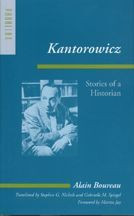Ernst Kantorowicz was a complex figure whose long incident-filled life seemed to embody many of the contradictions of the twentieth century. A Jew from a disputed area between Germany and Poland who fought on the German side in World War I, he first achieved academic success with Frederick II (1927), a work whose language, in Gabrielle Spiegel's words, "often came perilously close to that of the Nazi party" in its desire to see a reconstituted German nation once again dominant on the world stage. Forced to emigrate when the Nazis came to power, Kantorowicz later became embroiled in controversy...
Ernst Kantorowicz was a complex figure whose long incident-filled life seemed to embody many of the contradictions of the twentieth century. A Jew from a disputed area between Germany and Poland who fought on the German side in World War I, he first achieved academic success with Frederick II (1927), a work whose language, in Gabrielle Spiegel's words, "often came perilously close to that of the Nazi party" in its desire to see a reconstituted German nation once again dominant on the world stage. Forced to emigrate when the Nazis came to power, Kantorowicz later became embroiled in controversy when, at Berkeley during the McCarthy era, he refused to sign an oath of allegiance designed to identify Communist Party sympathizers. Resigning from Berkeley as a result of the controversy over the loyalty oath, Kantorowicz moved to the Institute of Advanced Study in Princeton, where he remained for the rest of his life and where he wrote his masterpiece, The King's Two Bodies.
Kantorowicz the historian, however, had no wish to see his own life become a subject of historical study. When he died in 1963, his will directed that all his personal papers be destroyed. Why had a historian so involved in history wished to erase himself from it? In Kantorowicz: Stories of a Historian, Alain Boureau confronts this question by writing a unique work which is as much a speculation on the nature of biography as it is a biographical study. In the absence of personal records, Boureau seeks to get at the interior life of this enigmatic individual through the recourse of "parallel lives"—real-life figures and characters from novels of the time who were faced with similar crises and who shared aspects of upbringing, training, and circumstance.
This fascinating, nontraditional biography, originally published in France in 1990, appears for the first time in English, translated by Stephen G. Nichols and Gabrielle M. Spiegel.






